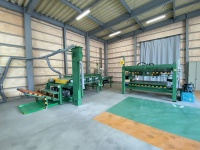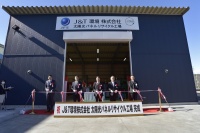J&T Kankyo bắt đầu vận hành toàn bộ "nhà máy tái chế" cho các tấm pin mặt trời

Máy tách khung nhôm
(Nguồn: Kỹ thuật JFE)

tách kính
(Nguồn: Kỹ thuật JFE)
bên trong nhà máy
(Nguồn: Kỹ thuật JFE)
Nhà máy tái chế tấm năng lượng mặt trời
(Nguồn: Kỹ thuật JFE)
J&T Kankyo (Thành phố Yokohama), một công ty thuộc tập đoàn JFE Engineering (Chiyoda-ku, Tokyo), đã xây dựng một cơ sở phân hủy tấm pin mặt trời tại Thành phố Isesaki, Tỉnh Gunma và sẽ bắt đầu hoạt động với quy mô lớn từ tháng 12. Lễ khai mạc được tổ chức vào ngày 24 tháng 11.
Nhà máy có công suất xử lý hàng năm là 1440 tấn và có thể xử lý khoảng 240 tấm pin mặt trời đã qua sử dụng mỗi ngày. Sau khi khung nhôm được phân tách bằng máy phân loại, bề mặt kính của bảng điều khiển được tách thành các tấm và kính hình viên bằng máy nghiền, và mỗi tấm được cung cấp cho tuyến đường tái chế. Ngoài ra, các tấm phế thải bị hư hỏng hoặc biến dạng, thường khó xử lý, sẽ được xử lý đúng cách.
Thiết bị được sử dụng để xử lý phân hủy được cung cấp bởi Chiyoda Machinery (Thị trấn Sugito, tỉnh Saitama). Ngoài ra, K Corporation (Chiyoda-ku, Tokyo) hợp tác với các kế hoạch kinh doanh như tái sử dụng (tái sử dụng như các tấm đã sử dụng).
Diện tích mặt bằng của nhà xưởng là 667m2 (bao gồm cả kho bãi). Vị trí cách Isesaki IC trên Đường cao tốc Kita Kanto khoảng 15 phút, giúp bạn dễ dàng tiếp cận và có hiệu quả giao thông tuyệt vời. Trong tương lai, các tấm pin đã qua sử dụng, dự kiến sẽ mở rộng nhanh chóng, sẽ được tháo dỡ thành dạng có thể tái chế (tái sử dụng làm vật liệu).
Các tấm pin mặt trời có tuổi thọ sản phẩm khoảng 25 đến 30 năm và dự kiến sẽ được thay thế với số lượng lớn vào những năm 2030 do tình trạng xuống cấp do lão hóa. Ngoài ra, việc xử lý đúng cách các tấm bị hư hỏng do số lượng thiên tai ngày càng tăng trong những năm gần đây đã trở thành một vấn đề. Để giải quyết những vấn đề này, J&T Kankyo đang chuẩn bị cho hoạt động kinh doanh tháo dỡ tấm pin mặt trời từ năm 2020 và có các bí quyết như thu gom hiệu quả các tấm pin đã qua sử dụng, phương pháp tái sử dụng và tái chế phù hợp cũng như đảm bảo lộ trình tái chế đã tích lũy.








